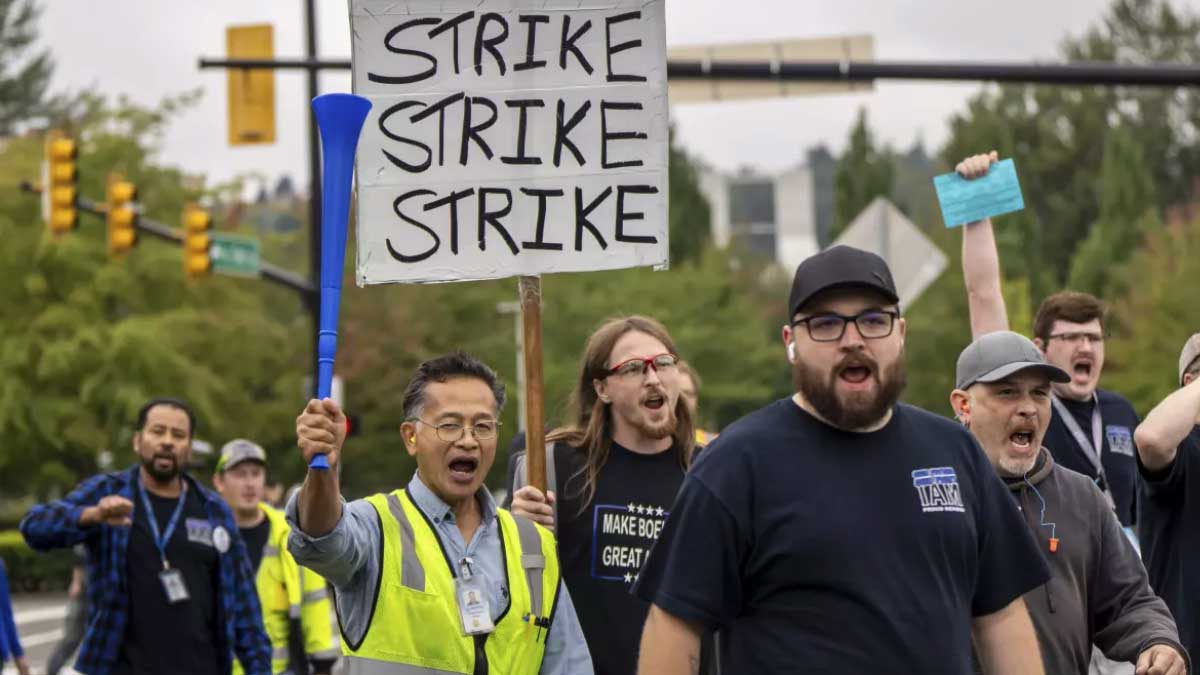- Home
- Billionaires
- Investing Newsletters
- 193CC 1000
- Article Layout 2
- Article Layout 3
- Article Layout 4
- Article Layout 5
- Article Layout 6
- Article Layout 7
- Article Layout 8
- Article Layout 9
- Article Layout 10
- Article Layout 11
- Article Layout 12
- Article Layout 13
- Article Layout 14
- Article Sidebar
- Post Format
- pages
- Archive Layouts
- Post Gallery
- Post Video Background
- Post Review
- Sponsored Post
- Leadership
- Business
- Money
- Small Business
- Innovation
- Shop
Recent Posts
Boeing Factory Workers Vote to Strike Over Pay Dispute

In a significant move, thousands of Boeing’s unionized factory workers voted to strike late Thursday, a decision that poses a substantial challenge for the aircraft manufacturer already under intense scrutiny over the safety of its products. The vote, which saw a resounding 94.6% of workers rejecting Boeing’s contract offer and 96% in favor of striking, marks a pivotal moment in the ongoing labor dispute.
Representatives from Districts 751 and W24 of the International Association of Machinists and Aerospace Workers (IAM), who represent approximately 33,000 Boeing employees, announced the vote results. The union’s decision to walk out is set to commence at midnight Pacific Time, reflecting the workers’ dissatisfaction with the latest proposal from the company.
The rejected tentative agreement included a proposed 25% wage increase over a four-year period and reduced healthcare costs. Despite these offers, the union’s leadership deemed the terms insufficient, prompting the move toward industrial action.
Jon Holden, President of District 751 IAM, expressed the sentiments behind the vote, stating, “This is about respect, this is about the past, and this is about fighting for our future.” Holden, who had previously advocated for accepting Boeing’s proposal, now emphasizes the union’s commitment to addressing the members’ concerns and negotiating further with the company. “We are prepared to return to the bargaining table to resolve these issues and address what our members need,” he added.
The IAM’s statement on the strike highlights the solidarity among its members across North America. The union aims to secure a robust contract that meets the needs of its workforce, underscoring the collective stance of the organization against the current offer.
The dispute arises in the wake of a tentative agreement reached over the weekend that was intended to prevent a strike. Boeing had proposed a deal that included the wage increase and pledged to build its next new aircraft in its Washington state facility, located in the Puget Sound area. Stephanie Pope, head of Boeing’s commercial airplanes division, described the contract as “historic.” She emphasized the benefits of the agreement, including the largest general wage increase ever proposed, reduced healthcare costs, enhanced retirement contributions, and improvements in work-life balance.
Despite the company’s assurances, Holden and the union leadership recommended rejecting the deal, with Holden acknowledging that a strike was likely due to the general sentiment of dissatisfaction among the workers. “The response from people is it’s not good enough,” Holden remarked, reflecting the prevailing mood within the union.
The timing of the strike adds further complications for Boeing, which is already facing heightened scrutiny over the safety of its passenger aircraft and other ongoing crises. The company’s 737 MAX planes, involved in two fatal crashes in 2018 and 2019, were grounded for over a year and a half. Recent concerns about the 737 MAX were reignited earlier this year when a door plug detached from an Alaskan Airlines flight shortly after takeoff. In July, Boeing agreed to plead guilty to a fraud conspiracy charge in connection with the 737 MAX crashes, and it remains under investigation for the Alaska Airlines incident.
Moreover, Boeing’s first spacecraft, the Starliner, encountered problems on its recent crewed mission. After transporting NASA astronauts Sunita Williams and Barry “Butch” Wilmore to the International Space Station, the Starliner was compelled to return to Earth without them due to safety issues. This additional setback has exacerbated the company’s challenges and intensified scrutiny from both regulators and the public.
The looming strike, therefore, not only highlights ongoing labor disputes but also reflects broader issues within Boeing’s operations and reputation. The outcome of the strike and subsequent negotiations will likely have significant implications for the company’s workforce, its production capabilities, and its public image. As the situation develops, all eyes will be on Boeing’s response and the potential impacts on its operations and ongoing safety concerns.
Recent Posts
Categories
- 193cc Digital Assets2
- 5G1
- Aerospace & Defense46
- AI37
- Arts3
- Banking & Insurance11
- Big Data3
- Billionaires449
- Boats & Planes1
- Business328
- Careers13
- Cars & Bikes76
- CEO Network1
- CFO Network17
- CHRO Network1
- CIO Network1
- Cloud10
- CMO Network18
- Commercial Real Estate7
- Consultant1
- Consumer Tech180
- CxO1
- Cybersecurity68
- Dining1
- Diversity, Equity & Inclusion4
- Education7
- Energy8
- Enterprise Tech29
- Events11
- Fintech1
- Food & Drink2
- Franchises1
- Freelance1
- Future Of Work2
- Games141
- GIG1
- Healthcare78
- Hollywood & Entertainment186
- Houses1
- Innovation42
- Investing2
- Investing Newsletters4
- Leadership65
- Lifestyle11
- Manufacturing1
- Markets20
- Media193
- Mobile phone1
- Money13
- Personal Finance2
- Policy567
- Real Estate1
- Research6
- Retail1
- Retirement1
- Small Business1
- SportsMoney33
- Style & Beauty1
- Success Income1
- Taxes2
- Travel10
- Uncategorized8
- Vices1
- Watches & Jewelry2
- world's billionaires418
Related Articles
Trump Moves $4B Stake in Truth Social Parent, Stock Drops 6%
Donald Trump recently transferred his 57% stake in Trump Media & Technology...
By 193cc Agency CouncilDecember 20, 2024House Rejects Trump-Backed Funding Bill, Shutdown Looms
The U.S. House of Representatives rejected a new government funding bill on...
By 193cc Agency CouncilDecember 20, 2024Trump Named Time’s Person of the Year for Second Time
On Thursday, Time magazine honored Donald Trump as its “Person of the...
By 193cc Agency CouncilDecember 12, 2024Meta Donates $1 Million to Trump’s Inaugural Fund
Meta, the parent company of Facebook and Instagram, has confirmed a $1...
By 193cc Agency CouncilDecember 12, 2024















Leave a comment